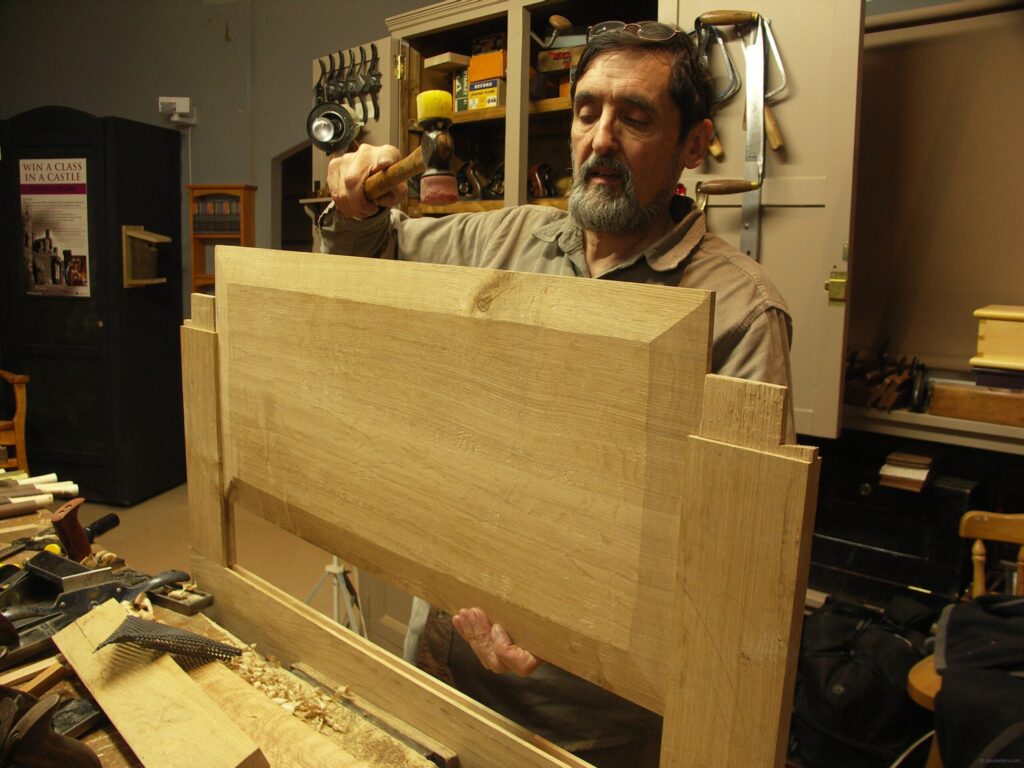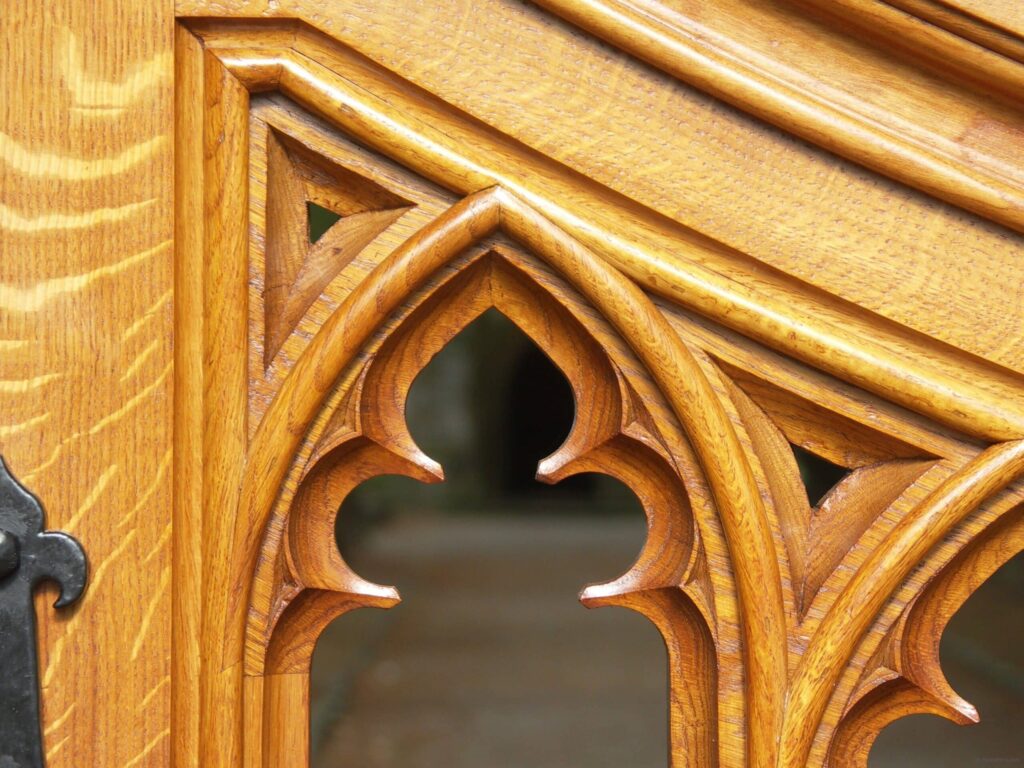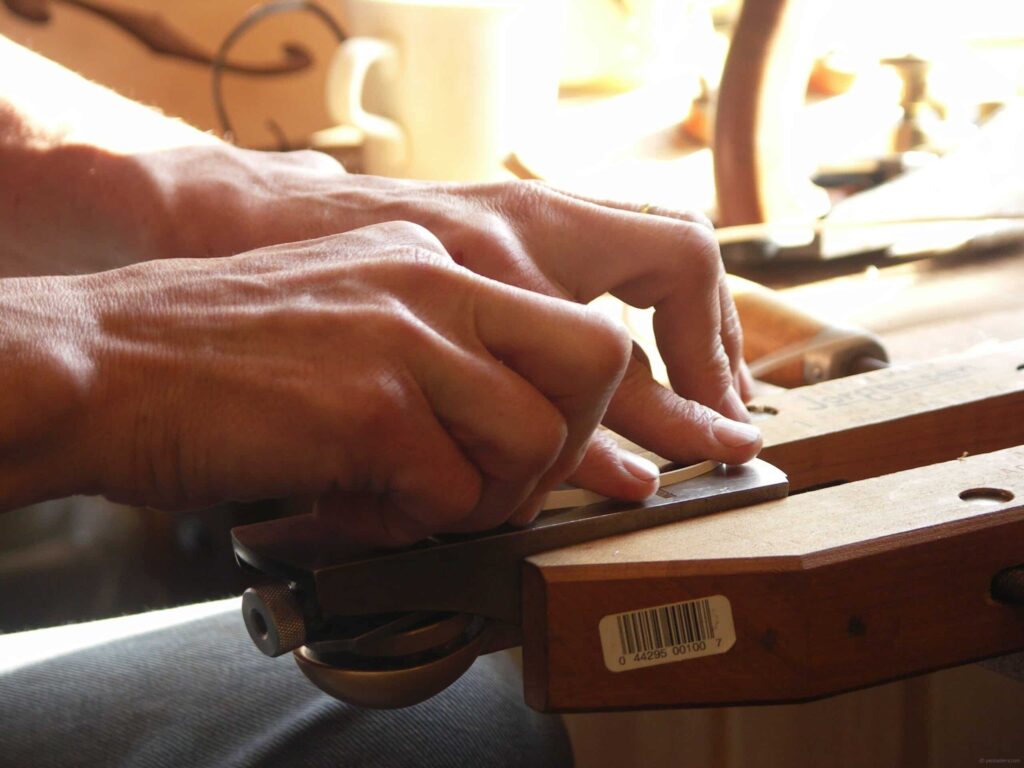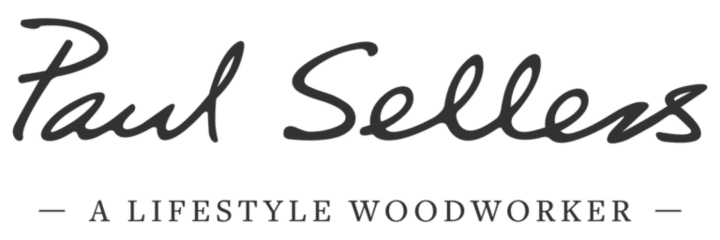Veracity is Everything
I’ve shared many times on this issue, even if the word is slightly different. Many say there is no such thing as truth but of course, there is! Truth, in fact, literal fact, is everything! In my working with wood I have earned that any compromise with regards to veracity means I leave something behind that later grows teeth and comes back to bite me later. Translate this into any and all areas of life and you see how, as the saying goes, it’s the little foxes that spoil the vine. Little foxes? The small, seemingly insignificant things we think won’t matter at any time. The little things we might simply know of but ignore the later significance of. The little things we might not realise will affect what we do later on. A hundredth of an inch out of square on the shoulder of a tenon magnifies 10 times if the length of the rail is ten times the width of the shoulder. A hundredth of an inch allowed in twist when we plane a rail flat does the same. Someone asked me how flat is dead flat, dead parallel, dead square, and so on? Well, as I said, any compromise compromises the finished piece. If we do compromise, even a small amount, we will need to compensate to accommodate for it elsewhere later on. Be painstakingly accurate, but do avoid being pedantic to the point of ruining your health. It pays!

Over the years my sharing about the interchangeability between these three words, accuracy, sensitivity and precision are critical to our human creative ability. To mete out measured effort from the hands, arms and shoulder area through the upper body, then the lower body and ultimately the whole engaged body to the cutting edge and edges of tools held only in our hands to deliver an exact, sensitive amount of energy and direction to every single cut we make depends on our total engagement. The wonderful thing about hand tools is that they demand our total cognisant presence. The more we focus on accuracy as the ultimate goal, the more sensitive we become. the more we care about how the cuts become effective, the more developed our energies and the more efficient our effort. It is a highly unfortunate thing that we have lost our patience for the process of both learning first and mastering next. The union between these two different functions is essential in the symbiotic process to our becoming highly skilled and productive hand toolists and true woodworkers in every sense of the word mastery. Whereas there are those who sometimes find skilled work to be second nature to them, many of us really struggle in the beginning. These others may have occupations that demand the very finest fine motor skills but such skills can be developed. this cause me to think of an eye surgeon I once knew who showed me some of the finest tools he worked with to repair parts of the eyes he worked on. His abilities were the most critical of any I had ever seen. He asked me once whether I had considered becoming an eye surgeon because he said my skills were the same as his. I said to him, ” I think I could fit that in on Saturdays!” and we laughed.

In so fast a fast-paced world it should come as no surprise that our attitude towards anything requiring patience can be somewhat waning. We tend to want things to happen immediately, a sort of microwave-mentality in the beginning of our early woodworking experience. I think that it is also true that many might think that having a higher intelligence translates into an automatic ability to work accurately and methodically in manual skills. Whereas it could and sometimes does, there is a development that needs to take place for everyone that doesn’t necessarily rely on IQ levels in the upper reaches. In the same way a man might prefer a chainsaw to take down a tree, rather than an ax and a two-man saw, so it has become with working with woodworking generally. Some say that the intelligent way is to use as little effort as possible therefore use machines for everything. I say much goes beyond efficiency and production rates and especially is this so for those looking to make their own personal woodwork a more intimate experience. The experience of hand work, and then too the extraordinary skills you can and will develop, far outweigh the end result of a finished piece. In my world of making, the process is worth a thousand times more than the ownership of a table, cot or rocking chair. If a tablesaw rips our sections into perfectly straight and square stock, dead parallel and almost to a polished level, then surely this is always the better way? Well, I see that logic, of course I do. In fact I take advantage of a bandsaw much of the time, and especially for a lot of repeat rip-cutting of materials to smaller sizes, but the marathon always take more strategising, effort and decision making than riding the bus and the car. So too riding the bike and walking. The immersive experience often cannot be quantified. I was talking to a friend who told me how greater sensitivity had come to the hand that was before then almost completely without sensitivity and feeling simply by a variety of interchanges that took place both mentally and physically. These are more abstract and yet as metaphysical realities they develop the additional feeling of simply feeling well and happy. When I strain and struggle with a plane on a rough board to develop a flat plane I feel incredibly well and the feeling remains for life, not just that minute, I believe. I often look at something I made 30 years ago and the memories come flooding back of the time I spent dropping that tree, de-limbing it, loading logs and limbs and driving through five gravel-bottomed rivers to get it home for slabbing it into boards. So too my arrival at a timber place and finding boards with high figuring just when I needed them the most. The freeze of crossbanding on all the surfaces and doors of the White House credenzas came from this experience exactly.

You cannot buy veracity like you can cologne in an atomizer bottle or tinned beans in a can. Veracitity comes by your personal quest for truth, ecxactness and accuracy. Accuracy is not just the square line and the straight edge of a shoulder line meeting in an intersection. Accuracy is all things joinery and all things woodworking. It’s the amount of pressure you apply and then the when to apply it and when to shift and alter the pressure too. It’s the direction you take and the angle you present at, the point at which you sharpen and the point at which you walk away. It is also the point at which you make the decision to use a machine over a hand tool too, without throwing the baby out with the bathwater.


Beautifully said, as always.
I’m a five-year beginner in the middle of my workbench project that’s going to take at least three months. 6 mortises down, two to go then on to the tenons.
I finally had an insight. Cut less, check more, avoid corrections! Fast is never faster.
Here’s a book recommendation based on your ideas – The Perfectionists, by Simon Winchester. A history of precision engineering, a whole book on the subject of the meaning of dead flat. And a great read.
Funny that the Simon Winchester book, “The Perfectionists” was referenced. I recently read the book and thought, now I bet Paul Sellers would enjoy this book.
Actually, I really doubt I would like it, but thank you for thinking of me though. Here is the issue for me at least, as a workman and a man working manually all my life. I don’t care too much for what I call ‘luxury authors‘; people who write about crafting, art, and then just people working manually itself in all spheres. They somehow manage to become experts on work and working for some very strange reason and become guest speakers on the art of working when their work is mostly mind work and typing words to conjure emotive speech and language that pulls people into the book they plan to sell. I don’t want to judge this book because I haven’t read it, but I have read many other books by holiday writers who somehow take a sabbatical from being a journalist to enter the world of the manual worker, car mechanic, farmer in sustainable farming and such, but never take all that goes with that. You know, minimum wage, feeding a family, difficult bosses high-demanding it over the minion and such. I wonder if it isn’t more just, well, an interesting-poor thing to do for a break from being a writer; a sort of antithesis to the mundane or writer’s block. You know, learning to fix a car or bike repairs for a year and such. Just an alternative way of looking at things. At one time I met with many journalists who seemed to take a brief vacation into my world and wrote about me and my work as though they could really understand what it took to get this or that work and then the whole of what it took to actually make something rough into a fine piece–feed my largish family, find ways to put clothes on their backs and such. Just And if course it can be interesting to those who might want a writer’s perspective on people working manually or whatever. Luxury writers, novelists with licence, vacation authors, holiday writers, such like that. Just my names for them, really. Just thought I would say what I think. Up to others if he gets a free plug on a worker’s website like mine.
Paul, I hate to disagree and since I don’t really know you I can’t be certain, but I think you would really enjoy the book. The book in no way attempts to discuss the hows or skills needed to achieve precision, rather it’s more of a history book discussing how our ability to measure precisely determines what we can actually build, a book about engineering.
Just like in woodworking there are writers that are hacks and charlatans who presume to “know” just by chatting with someone. However just like woodworkers there are writers that are craftsmen and those that are hacks and even those who are artists.
Winchester is particularly skilled at observing and describing history, without presuming to know any more than the facts at hand, you can learn from him. Tracy Kidder is another, his book House describes building a house from design to construction and his book The Soul of A New Machine does an excellent job of describing the building of a new computer. Both writers have the skill of crafting sentences that are a pleasure to read.
My apologies. I didn’t really think of it that way, but I see your point.
Heading over to woodworking masterclasses to buy a paid membership!
I’ve free-loaded long enough.
Respectfully, Jon
Jon and Paul,
Thank you both – I just put a hold on that book – the county library is opening up again, by appointment of course, and I have been starving for good books – I will enjoy this one.
Great book and well worth the time to read. Really interesting discussion of how precision enables technology and vice versa.
No issue my end. Just saying the unsaid, that’s all. Even reading such efforts can be a luxury to a busy working man feeding his family too.
I couldn’t agree more. Books like: ‘How to Save Money’ …Well, just don’t spend money on that book, or ‘How to Get Things Done NOW’, ‘How to Make Time for …’ …
Simple, DON’T read that book and get back to your bench.
Sharpen a chisel, sweep the floor. Repair the handle of that door while you’re there. That is much more than you would have achieved reading ‘the’ book. Before you know it’s past ten pm and you’ll feel accomplished. No book can teach you that. It’s fun to read about Krenov, but it is much more fun to watch Paul make something he designed for YOU, knowing you will be inspired to get better. Paul isn’t about perfectionism, but about accuracy. Ten tools, three joints, and a bench. You’ve got your work cut out for you … No time to waste.
As any book about time-management could tell you.
I think you just wrote the world’s best self help book. Brief and effective.
Paul, too often we try to perform at the rate of the speed of light. This drive will always create more issues than solutions. I have tried to keep up with the competition of life before, but after reading your blog today, you have brought back something that was constantly driven into me by my father. His thoughts include doing the job right; too fast and you will have to redo your work. A speedy solution is a poorly thought out solution. Over the years I lost sight of his habits and engaged into the many habits that he loathed. It has made me rethink that I can do better only if I try. It is not the finished product but the journey that satisfies. Thank you, Paul. Stay healthy!
I have found that the Time I spent setting up a tool to make a cut took me longer than if I went ahead and made my cut with a hand tool. Taking my time has saved me time in the end.
My father used to tell me, “If you don’t have the time to do it right the first time, where are you going to find the time to re-do it?”
It has taken 63 years, but I think I’ve finally got it.
It sounds like a dad-saying if ever I heard one. Well done Dad!
Like an old monk used to say, “Go slow. You don’t have all the time in the world”
I think when people say, “There is no such thing as the truth” they are trunctuating the statement somewhat. What they really mean is, there is no such thing as the absolute truth. Which is a whole philosophical can of worms that I won’t try to delve into here and now. Because it is pointless circular logic that lacks all practical value. Although I will just say that I do agree with the entire latter sentiment. The absolute truth is beyond our mortal ability to comprehend. We are only human after all. Something as big as the absolute truth is reserved for beings far more powerful than we are.
One man’s flat is another man’s non-flat. When I hear the term ‘dead-flat’ I want to get out the optical-flat glass, fire up the monochromatic light source and start counting interference lines…
And even then, there is actual perfect flatness, in the mathematical sense. And whilst on the topic of books, ‘Flatland’ by Edwin Abbot(t?) I have always found an enjoyable read, explaining dimensions. The book was first recommended by my math teacher but I read it only a decade later. I must admit that books that are recommended to me I rarely enjoy. I understand mr. Sellers also didn’t enjoy ‘Zen and the art of motorcycle maintenance’, yet I see many similarities in mr. Pirsig’s writing and the philosophy of mr. Sellers. Anyway, I will keep an eye open for a copy of ‘The perfectionists’, the topic is interesting to me.
I suppose when it comes to woodworking the trick is to use common sense and experience of how much flatness is definitely required, and where one can be a bit more easy-going and get away with it. And that experience and knowledge nobody is born with but has to be earned and paid with time, effort and frustration.
Like others, I’ve learned the hard way to check my work much more often before making a cut. It takes only a few seconds to do so but saves heaps of annoyance. It’s always a bit awkward when the dovetailed ‘box’ comes out in a Z-shape…
Another timely post for me. I find that accuracy goes out the window as soon as I put myself under any time pressure. If I say I have be at such and such a point by this time, I am guaranteed to get something wrong. “Slow down and enjoy the process” – a difficult lesson I am still learning.
As an engineer by trade, I have to nitpick equating accuracy and precision; they are not the same. If a vehicle is going 62 mph, it is more accurate to say they are going 60 than 70, but more precise to say 70.004, despite being completely inaccurate.
Accuracy is how close to correct a measurement is, precision is to what fidelity a measurement is taken. A measurement can be both accurate and imprecise and a different measurement can be both precise and innaccurate.
Like the weather forecast, usually very precise but not very accurate.
Truth is a pathless land only one can walk on their own.
It is not subjective.
Truth put simply is the nature of reality.
If one needs truth verified then one must for their self.
Paul, I am very interested by the second photo in this post, with the closeup of the door with very intricate shapes. Is there any chance that you can share some of these techniques with us?
I am a shipwright, paddle builder and extremely impatient. I seek this truth you speak of, but can’t put food on the table if I spend four weeks building something that should take four hours. How do you strike that balance Mr. Sellers?
The customer may not tell be able to tell the difference, but I can. I have to look myself in the mirror at night; and when I wonder whether or not I put in an honest shift, I am reminded by the words of one of my mentors:
Perfect is perfect, but done is better.